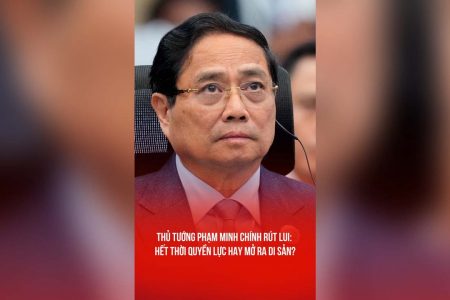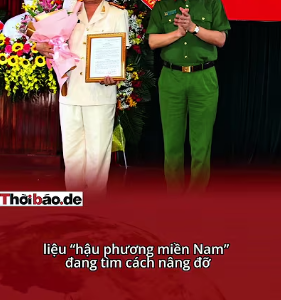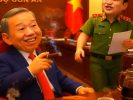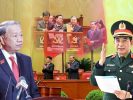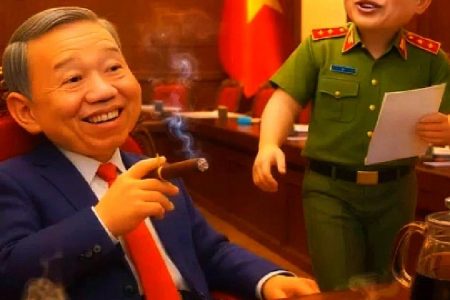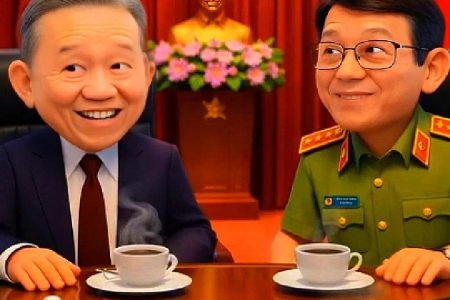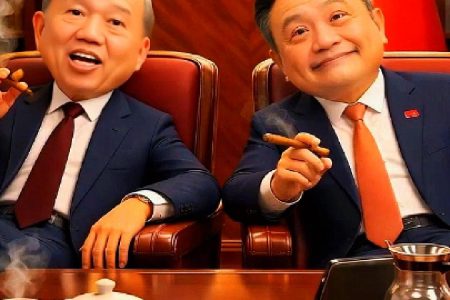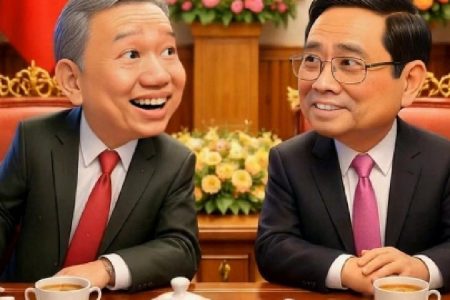Defend the Defenders, Press Release, January 2, 2021
According to Defend the Defenders’ statistics, as of December 31, 2020, Vietnam’s communist regime is holding at least 258 prisoners of conscience in prisons or other forms of detention. The number does not include Ngo Hao (m) whose sentence is currently suspended for medical treatment and Le Anh Hung (m) who are forcibly committed in mental hospitals without judicial process. The list includes female activist Huynh Thuc Vy (f) who has been convicted and sentenced but is held under house arrest in the maternal period and Australian citizen Chau Van Kham (m) who was found guilty of terrorism under Article 113 of Vietnam’s Criminal Code.
The number does not include 15 land petitioners from Dong Tam commune who were arrested on January 9 this year during the police raid in the locality and convicted of “resisting on-duty state officials” at the first-instance hearing on September 7-14 but given probation sentences.
As many as 27 of the prisoners of conscience identified by Defend the Defenders are women human rights defenders (WHRDs).
In total, 186 people, or 72% of the list, are from the Kinh ethnic majority. The second-largest ethnic grouping on the list is Montagnards, a loose set of religious and ethnic minorities who live in the mountains of the Central Highlands. They account for 62 people or 24% of those on the list. There are eight prisoners of conscience from the Hmong ethnic minority and two on the list are Khmer Krom.
Bloggers, lawyers, unionists, land rights activists, political dissidents, and followers of non-registered minority religions have been arrested and detained for peacefully exercising their internationally and constitutionally protected rights, principally the right to freedoms of expression, peaceful assembly, and religion or belief. The list does not include individuals who have engaged in or advocated violence.
Vietnam still holds 33 activists in pre-trial detention, seven of them were arrested in 2018-2019 and the remaining 24 were arrested in 2020. Among them are prominent independent journalist Pham Chi Dung (m), who is the president of the unregistered Independent Journalists Association of Vietnam (IJAVN) and its Vice President Nguyen Tuong Thuy (m) and well-known political blogger Pham Chi Thanh (aka Pham Thanh- m), and globally-recognized human rights defender and political blogger Pham Doan Trang (f). Dung, Thuy, and Le Huu Minh Tuan, an editor of the IJAVN, will be brought to court on January 5, 2021, on the allegation of “conducting anti-state propaganda” under Article 117 of the Criminal Code. They face imprisonment of between ten and 20 years in prison if are convicted.
The above includes 225 who have been convicted – mostly of political crimes under Articles 79, 87, and 88 of the1999 Penal Code or Article 109, 117, and 331 in the 2015 Criminal Code. The total number includes:
– 50 activists convicted or charged with subversion (Article 79 of 1999 Penal Code or Article 109 in the 2015 Criminal Code);
– 49 activists convicted or charged with anti-state propaganda (Article 88 of the 1999 Penal Code or Article 117 of the 2015 Criminal Code);
– 56 people from ethnic minorities were convicted of undermining the national unity policy (Article 87 of the 1999 Penal Code or 116 of the 2015 Criminal Code);
– 20 activists were convicted or charged with “abusing democratic freedom” (Article 258 of the 1999 Penal Code or Article 331 of the 2015 Criminal Code);
– 13 activists were convicted or charged with “disruption of security” under Article 118 of the 2015 Criminal Code;
– 30 individuals were convicted of or charged with “disrupting public orders” (under Article 245 of the 1999 Penal Code or Article 318 of the 2015 Criminal Code) for their peaceful activities. As many as 17 of them were imprisoned for participating or being suspected of planning to participate in the mass demonstrations in mid-June 2018 and their aftermath;
– Three activists Chau Van Kham (male, Vietnamese Australian), Nguyen Van Vien (m), and Tran Van Quyen (m) were convicted of “terrorism” under Article 113 of the 2015 Criminal Code.
– The charges for 13 individuals are unknown, including three Montagnards followers of the Ha Mon sect arrested on March 19 this year.
Vietnam is among the world’s biggest prisons for journalists and Facebookers, holding 28 of them in police custody, according to the Paris-based Reporters Without Borders (RSF)’s report released on December 1. The New York-based Committee to Protect Journalists (CPJ) has also listed Vietnam among the global biggest prisons for journalists with 15 journalists being imprisoned.
Background
In order to ensure a “stable society” for the ruling Communist Party of Vietnam (CPV) to carry out local party congresses and prepare for its 13th National Congress scheduled for late January 2021, the communist regime has tightened control over the nation, intensifying its crackdown on local political dissidents, government critics, social activists, and human rights defenders.
The crackdown continues before and after the European Parliament ratified the EU-Vietnam Free Trade Agreement (EVFTA) in late March and reached its peak in May-June with the detentions of 12 activists.
Like the US, the EU, and other countries are focusing on their own problems caused by the Covid-19 pandemic and the US Presidential Election on November 3, Vietnam’s communist regime used the opportunity to intensify its crackdown on local dissent without being criticized by the international community. The persecution has peaked in recent months with the arrests of a dozen of activists who have been charged with controversial articles of the national security provisions in the Criminal Code.

Arrest in 2020
Between January 1 and December 31, Vietnam arrested 34 activists and 29 land petitioners in Dong Tam commune. As many as 13 activists were charged with “conducting anti-state propaganda” and among them is prominent political blogger Pham Doan Trang, Vice President of the unregistered professional group Independent Journalists Association of Vietnam (IJAVN) Nguyen Tuong Thuy, blogger Pham Thanh, four human rights defenders in Duong Noi, environmentalist Dinh Thi Thuy Thuy and Central Highlands-based independent journalist Tran Thi Tuyet Dieu. Ten others were alleged to “abusing democratic freedom,” including well-known blogger Truong Chau Huu Danh.
In mid-March, authorities in the Central Highlands reported that they arrested the last three followers of the Ha Mon sect who have lived in the forest in the past eight years in order to avoid being arrested by the communist regime. The regime considers the sect illegal and strives to disband it by imprisoning its key followers and founder.
On October 6, on the day of the 24th Annual Human Rights Dialogue between the US and Vietnam, authorities in Hanoi arrested Pham Doan Trang and accused her of “conducting anti-state propaganda” under Article 88 of the Penal Code and Article 117 of the Criminal Code. She is facing imprisonment of up to 20 years if is convicted.
On January 9, after sending thousands of riot policemen to kill Dong Tam communal leader Le Dinh Kinh, authorities in Hanoi detained more than 30 local land petitioners, including relatives of Mr. Kinh who held many key positions in Dong Tam commune’s government. Later, they charged six of them with “murder” and the remaining 23 with “resisting on-duty state officials” in order to revenge for the local land petitioners’ resistance opposing the city’s plan to grab their agricultural field named Senh since 2017.
In late September, police from the Central Highlands province of Dak Lak kidnapped Ho Chi Minh City-based Pham Dinh Quy, a lecturer of Ton Duc Thang University, and Hoang Minh Tuan, a teacher at Le Thanh Ton High School in the central city of Nha Trang, and deported them to their headquarters in Buon Ma Thuot city for interrogation regarding their denunciation against Secretary Bui Van Cuong of the Dak Lak Party Committee for plagiarism while making his Ph.D. dissertation. The two were held incommunicado and investigated for “slander” as the Dak Lak province police criminalized a civil dispute between the two detainees and Secretary Cuong, who is a member of the party’s Central Committee and a candidate for the minister of Information and Communication for the next term.
Convictions in 2020
In 2020, Vietnam’s communist regime convicted 22 activists and 29 Dong Tam land petitioners.
Four activists were found guilty of “conducting anti-state propaganda” and sentenced to between five and 12 years in prison. Democracy campaigner Nguyen Trung Linh was sentenced to 12 years in prison, the toughest imprisonment for this charge. He was held incommunicado since his arrest in late May 2018 until being secretly tried in July this year.
Five Facebookers were convicted of “abusing democratic freedom” for their online posting and sentenced to between nine months and 18 months in prison.
In mid-December, a communist army veteran and blogger Tran Duc Thach was convicted of subversion and sentenced to 12 years in prison and three years of probation by the first-instance hearing which lasted only three hours. The 68-year-old democracy activist was arrested in late April.
In mid-March, the People’s Court of the northern province of Dien Dien convicted Sung A Sinh (m) and Lau A Lenh (m) of the Hmong ethnic minority of subversion and sentenced them to life imprisonment, the toughest imprisonment for subversion. According to the state-controlled media, the two activists persuaded other ethnic Hmong in August 2018 and March 2019 to establish a Hmong state in the Muong Nhe district of Dien Bien. Twelve others were considered accomplices and sentenced from two to 20 years in prison for the same crime. No information is available about the others.
On July 31, the People’s Court of Ho Chi Minh City convicted eight members of Hiến Pháp (Constitution) named Nguyen Thi Ngoc Hanh (f), Hoang Thi Thu Vang (f), Ngo Van Dung (m), Doan Thi Hong (f), Tran Thanh Phuong (m), Le Quy Loc (m), Do The Hoa (m) and Ho Van Cuong (m) who were arrested in early September 2018 and charged with “disruption of security” under Article 118 of the Penal Code in reprisal of their active participation in the mass demonstration in HCM City on June 10, 2018, in which tens of thousands of people rallied to protest two bills on Special Economic Zones and Cyber Security. During the short trial which failed to meet international standards for a fair trial, the activists were sentenced to between 30 months to eight years in prison and two to three years of probation. Four activists Ngo Van Dung, Le Quy Loc, Ho Van Cuong, and Nguyen Thi Ngoc Hanh have appealed the court’s judgment and their appeal hearing is scheduled on January 8 next year.
During the first-instance hearing against 29 Dong Tam land petitioners on September 7-14, the Hanoi city People’s Court found six of them guilty for the unverified deaths of three police officers during the bloody attack in the commune on January 9 and convicted the remaining 23 of “resisting on-duty state officials.” The trial, scheduled to last ten working days, was wrapped up on September 14 as the judge decide to impose the death penalty for Le Dinh Cong and Le Dinh Chuc, sons of elderly communal leader Le Dinh Kinh, a victim of an extrajudicial killing by police, and life imprisonment for his grandson Le Dinh Danh. Three others were given between 12 years and 16 years in prison while eight others were sentenced to between three years and six years in prison. As many as 15 others were given probation of between 15 months and five years of probation. The trial was unfair with a number of violations of the Criminal Procedure Code by the judges, the Hanoi People’s Procuracy, and the city Police Department. The European Union, the UK government, and a number of international human rights groups such as Human Rights Watch and Amnesty International have condemned the court judgment. Defend the Defenders and the California-based organization Vietnam Human Rights Network have also issued a joint statement calling on the Vietnamese government to free all the 29 Dong Tam land petitioners and drop the charges against them as well as to conduct an impartial and fair investigation to bring those responsible for the raid and killing of Mr. Kinh to court.
The Higher People’s Court in Hanoi has upheld on appeal the sentences of 11 years in prison and five years of probation given to human rights defender Nguyen Nang Tinh (m) on the charge of “conducting anti-state propaganda” by the People’s Court of Nghe An province in the first-instance hearing in mid-November last year.
Along with convicting activists without clear evidence of controversial articles in the National Security provisions of the Criminal Code in short trials that have not met international standards for a fair trial, the communist regime has also imposed lengthy imprisonments, tougher than imprisonments in political cases a decade ago. Mr. Nguyen Trung Linh was sentenced to 12 years in prison for “conducting anti-state propaganda.” Also in 2020, the Higher People’s Court in Hanoi upheld the 11-year imprisonment of Mr. Nguyen Nang Tinh on the same allegation, the highest imprisonment until being surpassed by Mr. Linh’s imprisonment this year. In the last two years, other activists were sentenced to between five and eight years in prison for the same charge. A decade ago, activists convicted of the same charge were sentenced to between three and four years in prison.
Last year, Vietnam sentenced Le Dinh Luong to 20 years in prison on a charge of subversion. This year, Sung A Sinh and Lau A Lenh from Hmong ethnic minority were given life imprisonment on the same charge.

Mistreatment in prison
Vietnam’s Ministry of Public Security continues its policy to keep prisoners, especially prisoners of conscience, under hard living conditions in a bid to punish them for their non-violent activities but harmful for the communist regime and break their mental strength. Along with sending prisoners of conscience to prisons far from their families, it allows authorities in the prisons and the temporary detention centers to apply other psychological measures to make the life of jailed activists harder, such as denying them their rights to regular meetings with their families and receiving additional food and medicines from their relatives, placing them in solitary cells or isolated areas, or forcing them to work hard without proper protective equipment. It also puts added psychological and financial trauma on the family members.
In mid-April, police reportedly assaulted prisoners of conscience Ngo Van Dung (m) and Le Quy Loc (m), who were kept in Phan Dang Luu temporary detention facility under the authority of Ho Chi Minh City Police Department. Due to the severe injuries caused by the attacks, the two were hospitalized for treatment for a week. After that, Mr. Loc was returned to the facility while Mr. Dung was transferred to Chi Hoa temporary detention facility also under the authority of the city’s police.
In early January, authorities in Ba Sao Prison camp in the northern province of Ha Nam held Phan Kim Khanh (m) and Nguyen Viet Dung (m) in solitary confinement cells for weeks in revenge for their protest against inhumane treatment in prison. The United Nations Human Rights Council and Special Rapporteur on Torture hold that prolonged solitary confinement can constitute torture.
Detained activist Doan Thi Hong (f) told her family that she was held in severe living conditions in a temporary detention facility under the authority of Ho Chi Minh City’s Police Department during the investigation period as well as during pre-trial detention. Hong, a single mother, was arrested in early September 2018 when her daughter was less than three years old, was charged with “disruption of security”, and faces imprisonment of between three and seven years if she is convicted.
Many Dong Tam land petitioners have claimed that they were tortured during interrogation in the pre-trial detention. In addition, six of them were forced to make false confessions and the Hanoi police filmed and aired on the national television VTV, according to a report titled “Coerced on Camera: how Vietnam forces detainees to confess on TV” carried out by Madrid-based rights group Safeguard Defenders.
In 2020, due to maltreatment carried out by prison guards, prisoners of conscience in many prison camps, including An Diem Prison camp in Quang Nam province, Ba Sao Prison camp in Ha Nam province, Gia Trung Prison camp in the Central Highlands province of Gia Lai, etc. conducted lengthy hunger strikes to demand better treatment and stop mental and physical torture.
In March-December, as COVID-19 was spreading across the nation, authorities in Vietnam’s prison camps and temporary detention facilities did not allow the families and relatives of prisoners of conscience to meet them or provide them with additional food and medicine, as well as other essential items. Given the low-quality of food, health, and hygiene concerns in prisons, the lives of prisoners of conscience are often under serious threat.
On November 23, prominent democracy campaigner Tran Huynh Duy Thuc started his hunger strike while serving his 16-year imprisonment in Prison camp No. 6 in the central province of Nghe An in a bid to request for his release. According to his lawyers, he would benefit from the amendments of Criminal Code 2015 which became effective in 2018. According to Articles 7 and Article 109 of the new code, the crime of “Preparing to commit this crime [activities to overthrow the human government people] shall be sentenced to between 01 and 05 years’ imprisonment.” This is the basis for Mr. Tran Huynh Duy Thuc to pursuit an appeal from July 2018 asking the authorities to release him after he has continuously served his sentence from 2010. Vietnam’s communist regime remains silent after more than one month of his fasting despite the calls of international and domestic rights groups for his release.
According to Vietnam’s Law on Execution of Criminal Judgments effective in 2019, imprisoned people in prisons and temporary detention facilities across the nation enjoy relatively good food supplies. However, in fact, the food they receive from prison camps and detention centers is not enough for maintaining their health so their families have to supply them with additional food and stuff periodically, often twice a month. Sometimes during Covid-19 pandemics, authorities of prison camps and detention facilities refuse to allow their families to send food for them but deposit money so they can purchase at the facilities’ canteens at prices much higher than the market prices. It has caused difficulties for prisoners of conscience’s families given the fact that activists and families are under constant persecution of the local authorities which strive to block their economic activities.
Along with persecuting prisoners of conscience, authorities in some localities also harass their families. After arresting former prisoner of conscience Can Thi Theu and her two sons Trinh Ba Phuong and Trinh Ba Tu on the charge of “conducting anti-state propaganda” in late June, police in Hanoi and Hoa Binh continuously intimidate her family, summoning her husband Trinh Ba Khiem who is also a former prisoner of conscience and Mr. Phuong’s wife Do Thi Thu to police stations for interrogating about the detainees’ activities.
Many former prisoners of conscience reported that most of the prisoners of conscience from ethnic minorities have no family visits and their lives in prisons are very hard since they rely on the prison’s supply only.
Release from prison in 2020
In 2020, 38 prisoners of conscience were released or expected to complete their imprisonments. Defend the Defenders has no information which would confirm the release of most of them. However, Defend the Defenders still excludes their names from this list.
In late February, Christian Montagnard Y Ngun Knul (m) was released after spending the last 16 years in prison. He was arrested in 2004 and later sentenced to 18 years in prison on the charge of “undermining the unity policy.” He had a number of health problems as a result of long inhumane treatment in different prisons and died a few months after being released.
On September 18, Protestant pastor A Dao has released after four years of imprisonment thanks to the call from the US Commission for International Religious Freedom and some American Congressmen. He was arrested in August 2016 and sentenced to five years in prison after participating in a regional religious conference in East Timor.
In January, Vietnam’s authorities decided to suspend the imprisonment of prisoner of conscience Ngo Hao (m) for one year, allowing him to return home for disease treatment. The 72-year-old political prisoner was permitted to go home on January 9 from An Diem Prison camp in the central province of Quang Nam after seven years of being imprisoned on the allegation of subversion. The move to suspend his imprisonment by Vietnam’s authorities was made after years of appeal from him and his family as his health has worsened a long time ago. Probably they do not want to take risks with his case after the deaths of two prisoners of conscience Doan Dinh Nam and Dao Quang Thuc in 2019. It is unclear whether Mr. Ngo Hao has to go back to prison to serve his 15-year imprisonment or not.
Prisoner of conscience Huynh Duc Thinh was released in mid-December after being hospitalized for weeks for treatment of a hemorrhage stroke he suffered in unclear circumstance while in police custody a few weeks before his term ends. Police of HCM City maintained close surveillance when he was under critical conditions in a hospital until his one-year imprisonment ended. It is worth noting that his son Huynh Duc Thanh Binh was convicted of subversion and sentenced to ten years in prison last year.
Also in the same case with the father and the son, Vietnamese American Michael Minh Phuong Nguyen, who was sentenced to 12 years for subversion, was freed in late October after more than two years spending in Vietnam’s prison. He was deported to California where he reunited with his family. He accused Vietnam’s security forces of kidnapping him and his friends Huynh Duc Thanh Binh and Tran Long Phi on July 7, 2018, and interrogated him for many hours a day during the pre-trial detention.
In early January, Vietnam’s authorities freed Tran Thi Nga (f), who was arrested in January 2017 and later sentenced to nine years on allegation of “conducting anti-state propaganda,” but forced her to live in exile in the US together with her husband and two children.
Vietnamese Australian Chau Van Kham (m) has no such luck. In November last year, the 70-year-old democracy activist was convicted of terrorism and sentenced to 12 years in prison, but he is still serving his imprisonment although many Australian politicians and rights groups have called for his freedom.
In late July, Le Minh The (m) was released, three months ahead of his two-year imprisonment’s due. It was likely that medical doctor Ho Van Hai (blogger Ho Hai- m) was also freed several months earlier than his four-year jail after being arrested and charged with “conducting anti-state propaganda” in November 2016.
Defend the Defenders is concerned that authorities in Hanoi are still keeping blogger Le Anh Hung (m) in a local mental facility after investigating him on the respective allegations of “abusing democratic freedom” without any judicial process. The activist was subjected to forced medication, which can constitute torture under international law.
=============
The term “prisoner of conscience” (POC) was coined by Peter Benenson in the 1960s. It refers to any individual “imprisoned for his/her political, religious or conscientiously held beliefs, ethnic origin, sex, color, language, national or social origin, economic status, birth, sexual orientation or another status who have not used violence or advocated violence or hatred.”
Defend the Defenders is Vietnam’s independent non-profit organization working to promote human and civil rights in the Southeast Asian nation. It has a network of dozens of human rights defenders across the nation who report human rights abuse in their areas.
Appendix 1: List of arrested activists and land petitioners in 2020
Appendix 2: List of activists and land petitioners convicted in 2020
Appendix 3: List of Prisoners of Conscience Released in 2020
Appendix 4: List of Prisoners of Conscience as of December 31, 2020



